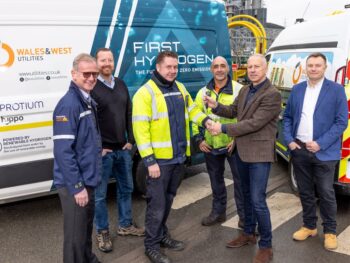Hydrogen van performance and range not reduced by cold weather, fleet trials show
Initial findings from fleet trials of a fuel cell van have shown no decrease in performance or range despite the colder weather.

The trials are said to show great promise for fleet use of hydrogen-powered vehicles among their operations
The trials, carried out by Wales & West Utilities (WWU), are said to show great promise for fleet use of hydrogen-powered vehicles among their operations.
The gas distribution network is trying out First Hydrogen’s prototype van for a month to see how the technology can decarbonise fleets while meeting everyday operational demands. It’s the latest fleet to test the zero-emission vehicle, already shown to offer a 400-mile range in SSE trials.
Initial findings show no decrease in performance or range when the hydrogen-powered vehicle is operating in colder temperatures. The data, taken from onboard telematics over a combined distance of 640 miles, reveals the first-of-its-kind vehicle has been operating for between six and seven hours per day in temperatures of between 2°C and 17°C, without impacting range.
This is a key differentiator from battery electric vehicles, which suffer with battery degradation in cooler and hotter temperatures.
The trials also show that the fuel cell powertrain delivers power, when needed, achieving outputs of 60kW in transient accelerations. With the vehicle’s peak range already having been shown in previous trials, it indicates the vehicle can manage more demanding duties for WWU, such as carrying heavier payloads, driving over hilly terrain or powering auxiliary equipment (onboard power).
The trials with WWU are supported by Protium Green Energy Solutions and Hyppo Hydrogen Solutions, which together with First Hydrogen, have created a hydrogen refuelling ecosystem to provide the infrastructure WWU needs for vehicle deployment.
Steve Gill, executive director automotive at First Hydrogen, said: “Thanks to the team at Wales & West Utilities, who have worked closely with our engineers, we have been able to collect more data from this deployment than in previous trials. The trials are generating interesting insight we can use to update our total cost of operation, which is key when securing purchase interest from prospective customers.
“One of the main complaints we hear from BEV drivers is the disparity between WLTP range and performance under real world conditions. The fact that our prototype vehicle is performing as expected during real-life operations is a strong selling point for fleet operators and builds confidence in FCEVs.”
Stephen Offley, transport manager at Wales & West Utilities, added: “We are impressed with the performance of First Hydrogen’s FCEV and the trials are giving us a real insight into the benefits and potential use of hydrogen vehicles in our fleet.
“For fleet managers it is important to have a reliable and repeatable range so we can plan daily operations without adjusting for colder weather and building in more time for recharging. February is one of the coldest months in south Wales and one of WWU’s busiest for emergency callouts, yet the cooler temperatures have not impacted the vehicle’s ability to respond to all the engineer visits we need it to.”
More detail on the fuel cell van’s deployment with WWU can be seen here.












